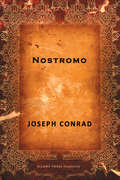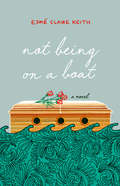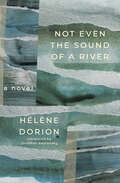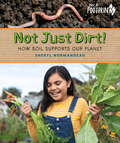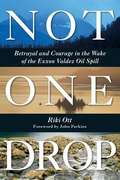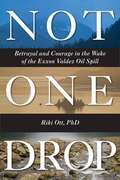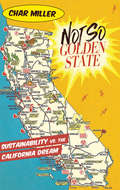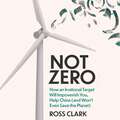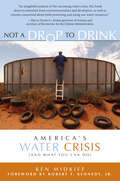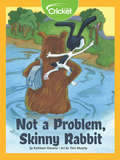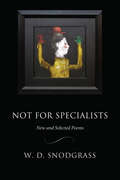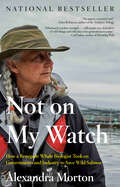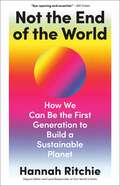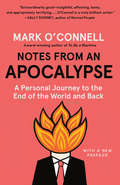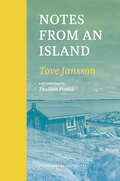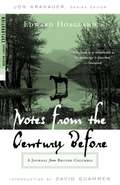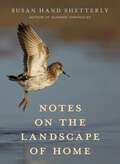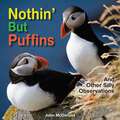- Table View
- List View
Nostromo
by Joseph ConradAs revolution rocks the nation of Costaguana, the seemingly incorruptible Nostromo is entrusted with the safekeeping and international sale of silver from his employer's mine. But when the boat transporting Nostromo and his cargo is sunk by rebels, Nostromo's decision to hide the silver on a deserted island comes to haunt him for the remainder of his life. Written at the height of author Joseph Conrad's career, Nostromo explores the impact of colonialism, rebellion, and corruption on an honourable man.
Not Being on a Boat
by Esme Claire KeithRutledge, an aging, divorced man, has treated himself to a Cruise on the Mariola. The Cruise is not just any cruise. It’s the whole shebang. It's around the world. It’s a lifestyle change: G & Ts and tuxedos and cigars and cognac galore. The service is top-rate. And Rutledge’s steward, Raoul, is a good kid. But then a day trip to a Caribbean port ends in commotion. Some people don’t make it back onto the ship. Rutledge, nonplussed, makes use of the vacant machines in the Fitness Room and the unoccupied loungers on deck. But soon, crew members seem few and far between, and the menu in the Captain’s Mess significantly diminished. Rutledge gets the feeling that something is amiss. And that’s just unacceptable. Welcome aboard Esme Keith’s debut dystopic novel, a cunning parody of modern day luxury and the coveted all-inclusive vacation, from the refreshingly blunt point of view of a man unable to see beyond his own needs, with hilarious results.
Not Even the Sound of a River (Literature in Translation Series)
by Jonathan Kaplansky Hélène DorionNot Even the Sound of a River is a profound and moving tale of love’s phantom pains as shared through the relationships between three generations of mothers and daughters.Hanna drives down the St. Lawrence River to her late mother’s hometown, hoping to find out more about the distant woman who began to reveal herself only through notebooks discovered in her effects. As the river widens, so does Hanna’s understanding of the matriarchs in her family. She learns that her mother’s true love, Antoine, died on the river when he was twenty, and that her grandmother also lost a young love to the water. Both remained shipwrecked after tragedy, their tales mirroring other survivors’—such as the few who survived the Empress of Ireland sinking, when more than a thousand people lost their lives on the same river in 1914.Through multiple perspectives, newspaper accounts, and documents, Dorion exquisitely describes the depths of love, the reality of living when dreams have failed us, and the complex nuance of blood ties. Not Even the Sound of a River is a gentle, exquisite story that defies time or place.
Not Just A Summer Crush
by C. S. Adler[From the front dust jacket flap:] "Awesome. That's the only word Hana can think of to describe her day on the whale-watching boat with her favorite teacher, Mr. Crane... David. Hana was sure she was going to have a miserable summer until she found David Crane sitting on the beach next to her grandmother's cottage on Cape Cod. He has come to the Cape to decide whether he should return to teaching in the fall. And, much to Hana's surprise, the young- teacher actually values her opinion. Twelve-year-old Hana is accustomed to feeling ignored by her family. Even at the beach house, her parents and three older siblings treat Hana like a child. Until, that is, they discover her growing friendship with David Crane, and immediately misinterpret it. How can Hana get them to see why this friendship is so special to her?"
Not Just Dirt!: How Soil Supports Our Planet (Orca Footprints)
by Sheryl NormandeauDirt is essential to life on Earth. Farmers grow food crops, such as wheat, barley and corn, in soil. We mine the soil for resources that we use in manufacturing and for fuel. Soil is used in the construction of roads and buildings, and it provides food and habitat for animals that live both underground and above ground. But soil can be easily destroyed by human activity and natural disasters. Pollution, deforestation and the effects of the climate crisis are damaging soil at an alarming rate. Explore the biological and economic importance of soil to living organisms, the threats it faces and why we must preserve and conserve soil for the future. Let's dig in and get the dirt on soil. Praise for Sheryl Normandeau: "Exploring seeds more broadly than most children's books on the topic, this volume encourages readers to collect, plant, and share seeds—a small, yet powerful resource."—Booklist review for Save Our Seeds "Normandeau conversationally provides readers with amazing facts and ways to utilize what they learned, including steps everyone can take to save seeds. Readers will be left empowered to help protect seeds."—Children's Literature Comprehensive Database (CLCD) review for Save Our Seeds
Not One Drop
by Riki OttThis DVD/book package should be read and viewed by everyone concerned with crimes against man and nature; about corporate lies and the value of community. Betrayed by oilmen's promises in the 1970s, the people of Prince William Sound, Alaska, awaken on March 14, 1989, to the nation's largest oil spill. Not One Dropis an extraordinary tale of ordinary lives ripped apart by disaster and of community healing through building relationships of trust. This story offers critical lessons for a society traumatized by political divides and facing the looming catastrophe of global climate change. Author Riki Ott, a rare combination of commercial salmon "fisherm'am" and PhD marine biologist, describes firsthand the impacts of oil companies' broken promises when the Exxon Valdez spills most of its cargo and despoils thousands of miles of shore. Ott illustrates in stirring fashion the oil industry's 20-year trail of pollution and deception that predated the tragic 1989 spill and delves deep into the disruption to the fishing community of Cordova over the following 19 years. In vivid detail, she describes the human trauma coupled inextricably with that of the sound's wildlife and its long road to recovery. Black Wave (DVD) -directed by Robert Cornellier, tells the story of the biggest environmental catastrophe in North American history. In a flash, dramatic images shoot across the planet. They show thousands of carcasses of seabirds and sea otters covered in oil. A thick black tide rises and covers the beaches of once-pristine Prince William Sound. For twenty years Riki Ott and the fishermen of the little town of Cordova, Alaska have waged the longest legal battle in U. S. history against the world's most powerful oil company - ExxonMobil. They tell us all about the environmental, social and economic consequences of the black wave that changed their lives forever. Not One DropandBlack Waveshow us how too many corporate owners and political leaders betray everyday citizens and how a community forges a new path from despair to hope.
Not One Drop: Betrayal and Courage in the Wake of the Exxon Valdez Oil Spill
by Riki OttShocking, factual, and inspiring, Not One Drop traces the twenty-year trail of Cordova, Alaska, residents as they cope with the largest oil spill and one of the longest-running court cases in U.S. history--and, ultimately, the failure of Exxon to come through on its promise to compensate them adequately for their losses and clean up their environment after the Exxon Valdez oil spill.
Not So Golden State: Sustainability vs. the California Dream
by Char MillerIn Not So Golden State, leading environmental historian Char Miller looks below the surface of California's ecological history to expose some of its less glittering conundrums. In this necessary work, Miller asks tough questions as we stand at the edge of a human-induced natural disaster in the region and beyond. He details policy steps and missteps in public land management and examines the impact of recreation on national forests, parks, and refuges, assessing efforts to restore wild land habitat, riparian ecosystems, and endangered species.Why, during a devastating five-year drought, is the Central Valley's agribusiness still irrigating its fields as if it were business as usual? What's unusual, Miller reveals, is that northern counties rich in groundwater sell it off to make millions while draining their aquifers toward eventual mud. Why, when contemporary debate over oil and gas drilling questions reasonable practices, are extractive industries targeting Chaco Canyon National Historic Park and its ancient sites, which are of inestimable value to Native Americans? How do we begin to understand "local," a concept of hope for modern environmentalism? After all, Miller says, what we define as local determines how we might act in its defense.To inhabit a place requires placed-based analyses, whatever the geographic scope--examinations rooted in a precise, physical reality. To make a conscientious life in a suburb, floodplain, fire zone, or coastline requires a heightened awareness of these landscapes' past so that we can develop an intensified responsibility for their present condition and future prospects. Building a more robust sense of justice is the key to creating resilient, habitable, and equitable communities.Miller turns to Aldo Leopold's insight that "all history consists of successive excursions from a single starting point," a location humans return to "again and again to organize another search for a durable scale of values." This quest, a reflection of our ambition to know ourselves in relation to time and space, to organize our energy and structure our insights, is as inevitable as it is unending.Turning his focus to the tensions along the California coastline, Miller ponders the activities of whale watching and gazing at sea otters, thinking about the implications of the human desire to protect endangered flora and fauna, which makes the shoreline a fraught landscape and a source of endless stories about the past and present.In the Los Angeles region these connections are more obvious, given its geography. The San Gabriel Mountains rise sharply above the valleys below, offering some of the steepest relief on the planet. Three major river systems--the Santa Ana, San Gabriel, and Los Angeles--cut through the range's sheer canyons, carrying an astonishing amount of debris that once crashed into low-lying areas with churning force. Today the rivers are constrained by flood-control dams and channels. Major wildfires, sparked by annual drought, high heat, and fierce Santa Ana winds, move at lightning speed and force thousands to flee.The city's legendary smog, whose origins lie in car culture, was fueled in part by oil brought to the region's surface in the late nineteenth century. It left Angelenos gasping for breath as climatic conditions turned exhaust into a toxic ozone layer trapped by the mountains that back in the day were hard to see. Clearing the befouled skies took decades.Every bit as complex is the enduring effort to regenerate riparian health and restore wildlife habitat in a concrete-hardened landscape. The emerging tensions are similar to those threading through the U.S. Forest Service's management of the Angeles National Forest, exacerbated whenever a black bear ambles into a nearby subdivision.How we build ourselves into these spaces depends on the removal of competing users or uses: a historic strawberry patch gives way to a housing development, a memorial forest goes up in smoke, a small creek tells a larger tale of the human impress, and struggles over water-a perennial issue in this dry l...
Not This Bear
by Bernice MyersAn amusing story for preschoolers or young readers with the pictures described. Herman is walking through the woods to visit Aunt Gert when a bear sees his furry hat and coat and thinks he's the bears' cousin Julius. Big Brown bear takes Herman home to his cave. Herman has fun eating supper with the friendly bears but he can't make them believe he's a little boy. Herman doesn't want to hibernate all winter long with them. Children will have fun finding out how Herman finally manages to go along his own way.
Not Zero: How an Irrational Target Will Impoverish You, Help China (and Won't Even Save the Planet)
by Ross ClarkThe British government has embarked on an ambitious and legally-binding climate change target: reduce the country's greenhouse gas emissions to Net Zero by 2050. The Net Zero policy was subject to almost no parliamentary or public scrutiny, and is universally approved by our political class. But what will its consequences be?Ross Clark argues that it is a terrible mistake, an impractical hostage to fortune which will have massive downsides. Achieving the target is predicated on the rapid development of technologies that are either non-existent, highly speculative or untested. Clark shows that efforts to achieve the target will inevitably result in a huge hit to living standards, which will clobber the poorest hardest, and gift a massive geopolitical advantage to hostile superpowers such as China and Russia. The unrealistic and rigid timetable it imposes could also result in our committing to technologies which turn out to be ineffective, all while distracting ourselves from the far more important objective of adaptation.This hard-hitting polemic provides a timely critique of a potentially devastating political consensus which could hobble Britain's economy, cost billions and not even be effective.
Not a Bean
by Claudia Guadalupe MartinezA Mexican jumping bean isn't a bean at all. It's a fascinating home and food source for a special kind of caterpillar!With Spanish vocabulary and a clever counting concept, this poetic story shares the life cycle of a Mexican jumping bean. This curious jumping insect is actually a seedpod from a shrub called yerba de la flecha, into which a caterpillar burrows, living inside the pod until it builds a cocoon and breaks out as a moth. Perfect for preschoolers and prereaders, this creative picture book explores the Mexican jumping bean's daily life and eventual transformation and escape from the pod.
Not a Butterfly Alphabet Book: It's About Time Moths Had Their Own Book!
by Jerry PallottaThis nature alphabet book from best-selling author Jerry Pallotta features moths (not butterflies!) of all shapes and sizes.Meet dozens of moths--and a few bonus creatures--with engaging text and a laugh-out-loud narrative, from A (Atlas Moth) to G (Green Lips Moth--no kissing allowed!) to J (Jersey Tiger Moth, whose underwings are a completely different color than their upper wings, not to be confused with their underwear) to Z (Zigzag Moth). Readers of all ages will be entertained (and learning!) with every page turn.
Not a Dog
by Claudia Guadalupe MartinezThe Mexican prairie dog is not a dog at all! It's part of the rodent family and is an endangered species.A fun and engaging nonfiction picture book for kids ages 3-7 that includes Spanish vocabulary, a shapes concept, and the life cycle of the Mexican prairie dog.A Mexican prairie dog may look like a dog, but it is certainly not a dog. This adorable mammal is actually part of the rodent family.Not a Dog explores the life cycle of the Mexican prairie dog, the species' contribution to a healthy ecosystem, and the ways farming has destroyed their habitat and made them an endangered species. Perfect for preschoolers and pre-readers, this charming and informative read-aloud introduces curious kids to one unique animal that is NOT a dog!
Not a Drop to Drink: America's Water Crisis (and What You Can Do)
by Ken MidkiffWater. We can’t live without it. Not a Drop to Drink sounds the alarm, detailing the current state of emergency facing the U.S. water supply. From the parched High Plains to corporate boardrooms, Ken Midkiff explores water wars, privatization, American agriculture, and global warming. And what we can do to get a glass of water.
Not a Problem, Skinny Rabbit
by Kathleen StevensBig Bear and Skinny Rabbit are going for a hike in the forest! Skinny Rabbit is worried that it might rain, but Big Bear insists that it will be okay. What happens when it does start to rain? Will Big Bear and Skinny Rabbit make it home without getting soaked?
Not for Specialists: New and Selected Poems (American Poets Continuum)
by W.D. SnodgrassUntil the late 1970s, W. D. Snodgrass was known primarily as a confessional poet and a key player in the emergence of that mode of poetry in the late 1950s and early 1960s. Snodgrass makes poetry out of the daily neuroses and everyday failures of a man—a husband, father, and teacher. This domestic suffering occurs against a backdrop of more universal suffering which Snodgrass believes is inherent in the human experience. Not for Specialists includes 35 new poems complemented by the superb work he wrote in the Pulitzer Prize winning collection, Heart’s Needle, along with poetry from seven other distinguished collections.from "Nocturnes"Seen from higher up, it makes its first move in the low creekbed, the marshlands down the valley, spreading across the open hayfields, the hedgerows with their tops still lit, laps the roadbed, flows over lawns and gardens, past the house and up the wooded hillside back behind us till only some few rays still scythe between the treetrunks from the far horizon and are gone.W. D. Snodgrass, born in Pennsylvania in 1926, is the author of more than 20 books of poetry, including The Fuehrer Bunker: The Complete Cycle (BOA, 1995); Each in His Season (BOA, 1993); and Heart's Needle (1959), which won the Pulitzer Prize for Poetry. His other books include To Sound Like Yourself: Essays on Poetry (BOA, 2002), After-Images: Autobiographical Sketches (BOA, 1999) and six volumes of translation, including Selected Translations (BOA Editions, 1998), which won the Harold Morton Landon Translation Award.
Not on My Watch: How a renegade whale biologist took on governments and industry to save wild salmon
by Alexandra MortonAlexandra Morton has been called "the Jane Goodall of Canada" because of her passionate thirty-year fight to save British Columbia's wild salmon. Her account of that fight is both inspiring in its own right and a roadmap of resistance.Alexandra Morton came north from California in the early 1980s, following her first love--the northern resident orca. In remote Echo Bay, in the Broughton Archipelago, she found the perfect place to settle into all she had ever dreamed of: a lifetime of observing and learning what these big-brained mammals are saying to each other. She was lucky enough to get there just in time to witness a place of true natural abundance, and learned how to thrive in the wilderness as a scientist and a single mother. Then, in 1989, industrial aquaculture moved into the region, chasing the whales away. Her fisherman neighbours asked her if she would write letters on their behalf to government explaining the damage the farms were doing to the fisheries, and one thing led to another. Soon Alex had shifted her scientific focus to documenting the infectious diseases and parasites that pour from the ocean farm pens of Atlantic salmon into the migration routes of wild Pacific salmon, and then to proving their disastrous impact on wild salmon and the entire ecosystem of the coast. Alex stood against the farms, first representing her community, then alone, and at last as part of an uprising that built around her as ancient Indigenous governance resisted a province and a country that wouldn't obey their own court rulings. She has used her science, many acts of protest and the legal system in her unrelenting efforts to save wild salmon and ultimately the whales--a story that reveals her own doggedness and bravery but also shines a bright light on the ways other humans doggedly resist the truth. Here, she brilliantly calls those humans to account for the sake of us all.
Not the End of the World: How We Can Be the First Generation to Build a Sustainable Planet
by Hannah RitchieThis "eye-opening and essential" book (Bill Gates) will transform how you see our biggest environmental problems—and explains how we can solve them. It&’s become common to tell kids that they&’re going to die from climate change. We are constantly bombarded by doomsday headlines that tell us the soil won&’t be able to support crops, fish will vanish from our oceans, and that we should reconsider having children. But in this bold, radically hopeful book, data scientist Hannah Ritchie argues that if we zoom out, a very different picture emerges. In fact, the data shows we&’ve made so much progress on these problems that we could be on track to achieve true sustainability for the first time in human history. Did you know that: Carbon emissions per capita are actually down Deforestation peaked back in the 1980s The air we breathe now is vastly improved from centuries ago And more people died from natural disasters a hundred years ago? Packed with the latest research, practical guidance, and enlightening graphics, this book will make you rethink almost everything you&’ve been told about the environment. Not the End of the World will give you the tools to understand our current crisis and make lifestyle changes that actually have an impact. Hannah cuts through the noise by outlining what works, what doesn&’t, and what we urgently need to focus on so we can leave a sustainable planet for future generations. These problems are big. But they are solvable. We are not doomed. We can build a better future for everyone. Let&’s turn that opportunity into reality.
Notes from an Apocalypse: A Personal Journey to the End of the World and Back
by Mark O'Connell"Harrowing, tender-hearted, and funny as hell" —Jenny Offill&“Fascinating…Oddly uplifting&” —The Economist"Smart, funny, irreverent, and philosophically rich" —Wall Street JournalBy the author of the award-winning To Be a Machine, an absorbing, deeply felt book about our anxious present tense—and coming to grips with the futureWe're alive in a time of worst-case scenarios: The weather has gone uncanny. Old postwar alliances are crumbling. A pandemic draws our global community to a halt. Everywhere you look there's an omen, a joke whose punchline is the end of the world. How is a person supposed to live in the shadow of such a grim future? What does it mean to have children—nothing if not an act of hope—in such unsettled times? What might it be like to live through the worst? And what on Earth is anybody doing about it?Dublin-based writer Mark O'Connell is consumed by these questions—and, as the father of two young children himself, he finds them increasingly urgent. In Notes from an Apocalypse, he crosses the globe in pursuit of answers. He tours survival bunkers in South Dakota. He ventures to New Zealand, a favored retreat of billionaires banking on civilization's collapse. He engages with would-be Mars colonists, preppers, right-wing conspiracists. And he bears witness to those places, like Chernobyl, that the future has already visited—real-life portraits of the end of the world as we know it. In doing so, he comes to a resolution, while offering readers a unique window into our contemporary imagination.Both investigative and deeply personal, Notes from an Apocalypse is an affecting, humorous, and surprisingly hopeful meditation on our present moment. With insight, humanity, and wit, O'Connell leaves you to wonder: What if the end of the world isn't the end of the world?
Notes from an Island
by Tove JanssonFrom a renowned artist and writer, a deeply personal nature journal about the island that informed her many works, with paintings from her longtime partner, artist Tuulikki &“Tooti&” Pietilä. In the bitter winds of autumn 1963, Tove Jansson, helped by Brunström, a maverick fisherman, raced to build a cabin on a treeless island in the Gulf of Finland. The island was Klovharun, where for thirty summers Tove and her beloved partner, the visual artist, Tuulikki &“Tooti&” Pietilä, lived, painted, and wrote, energized by the solitude and shifting seascapes. The island's flora, fauna, and weather patterns provided deep inspiration which can be seen reflected in all of Jansson's work, most famously in her bestselling novel The Summer Book and her longstanding comic strip and novels for children, Moomin. Tove's signature spare, quirky prose, and Tooti's subtle ink washes and aquatints combine to form a work of meditative beauty, a chronicle of living peacefully in nature and observing the island&’s ecology and character. Notes from an Island is both a work of artistic collaboration and an homage to the deep love the two women shared. One feels as if Jansson&’s journal, with Tooti&’s sketches tucked inside, has been unearthed like a treasure from under a pile of old quilts in the back of their rustic cabin. Praise for the essay, &“The Island&” &“At once a short story, an essay, and a prose poem, &‘The Island&’ reads both like a sketch for The Summer Book and a vignette of Klovharun ... the text seems to change following mysterious tides from a timeless present to an urgent past.&” —Hernan Diaz, finalist for the Pulitzer Prize Praise for Tove Jansson "It could be said that everything she wrote is, in one way or another, about the creative interactions between art and reality or art and nature."—The Guardian "Her style is not at all 'poetic'—quite the contrary. It is prose of the very highest order; it is pure prose. Through its quiet clarity we see unreachable depths, threatening darkness, promised treasures."—Ursula K. LeGuin, The Guardian &“Tove Jansson was a genius, a woman of profound wisdom and great artistry.&”—Philip Pullman &“It&’s hard to describe the astonishing achievement of Jansson&’s artistry.&”—Ali Smith
Notes from the Century Before: A Journal from British Columbia
by Edward Coolbaugh HoaglandShowcasing Hoagland's extraordinary gifts for portraiture --- his cast runs from salty prospector to trader, explorer, missionary, and indigenous guide --- "Notes from the Century Before" is a breathtaking mix of anecdote and unparalleled elegy from one of the finest writers of our time.
Notes of an Alchemist
by Loren C. EiseleyPoems on crystals, birds, the outdoors and all aspects of nature.
Notes on the Landscape of Home
by Susan Hand Shetterly&“If you pay attention to the land where you live, you enter into conversation with it, until it becomes a voice inside you, and some of the boundaries between you and it dissolve,&” write Susan Hand Shetterly. In this collection of elegant, spare, and often passionate essays, Shetterly explores what it is to live in a Down East coastal town, and to pay attention, over time, to what it offers of land, water, wildlife, and community. She takes her cue from Henry David Thoreau and Wendell Berry, who advocate for the virtues of staying in one place, believing that as we delve deeper into the landscape of home the more we learn about the world. As in many other places, this particular home place is in trouble. Shetterly celebrates the work of communities to restore environments their people know and love, and takes a closeup look at what is changing and what has been lost. Among her subjects are the reestablishment of the bald eagle, the reintroduction of the American turkey in Maine, and the turkey vulture&’s northward trend. She also writes about shorebird migrations, the bluefin tuna and the humpback and right whales in the Gulf of Maine, counting alewives along a stream in the spring, seaweed cultivation in a bay, a forest&’s rebirth, the island that gave her the imaginative space she needed, and more. She recounts how she and her neighbors kept each other company at a distance during the long months of the pandemic, and she celebrates coastal culture, its particular, deep history that anchors a person&’s sense of place.
Nothin' but Puffins: And Other Silly Observations
by John McDonaldWhat is it about puffins that makes them so endearing? Is it their portly, wide-eyed, toy-like appearance, or their large, brightly colored bills? Whatever the reason, puffins appeal to practically everbody. And the puffins on these pages are no exception. These sixty-four pictures of puffins at their most amusing, paired with witty commentary, are a unique presentation of Maine's favorite sea bird.

